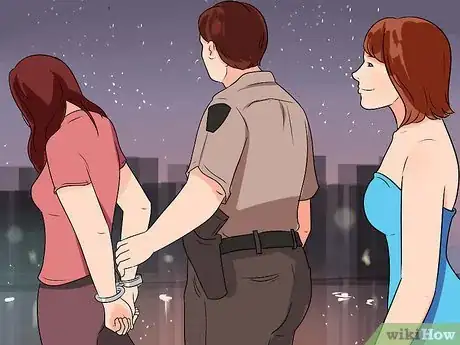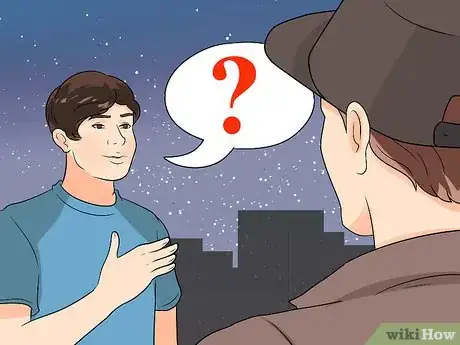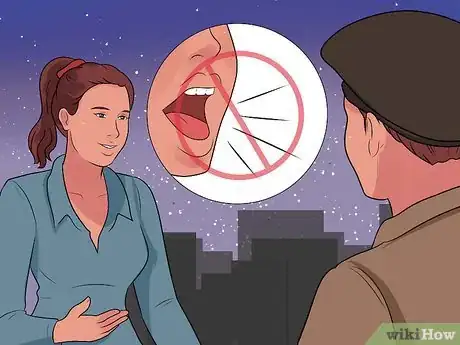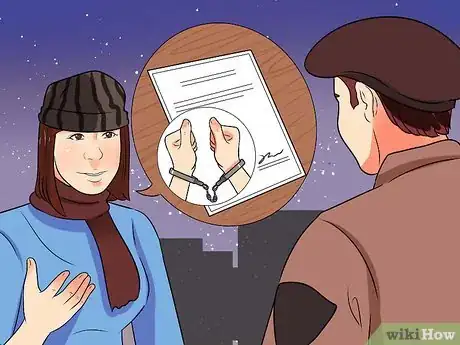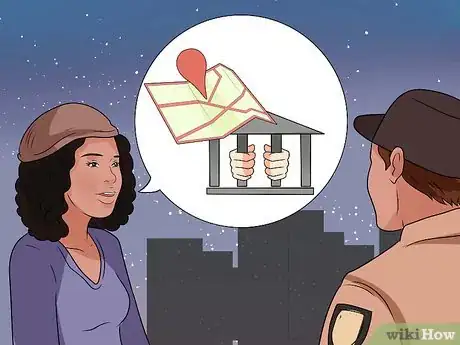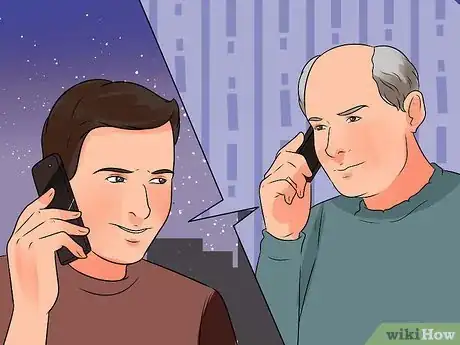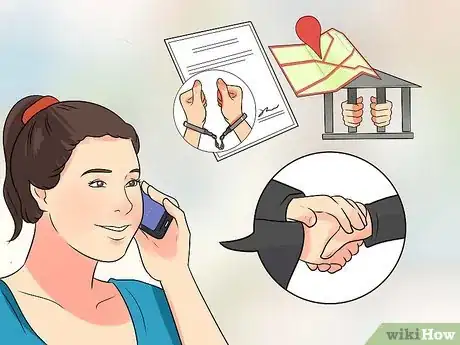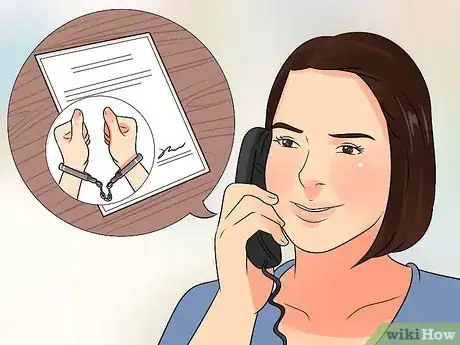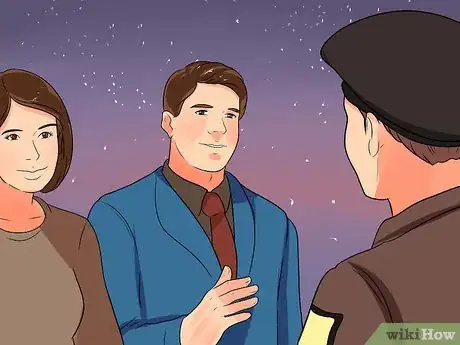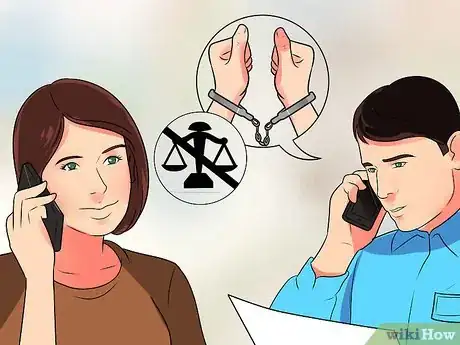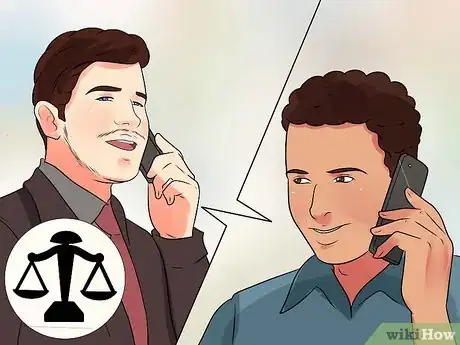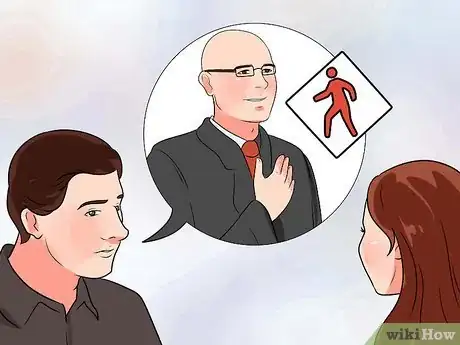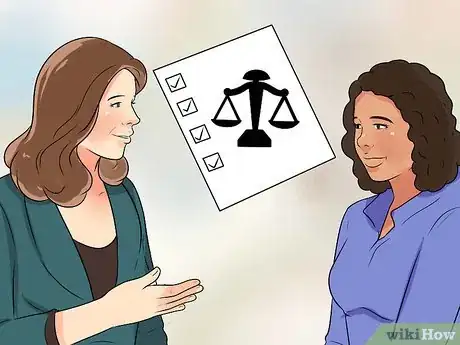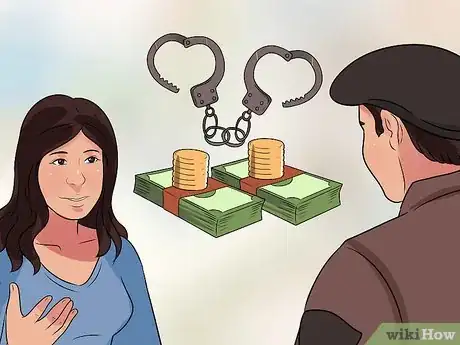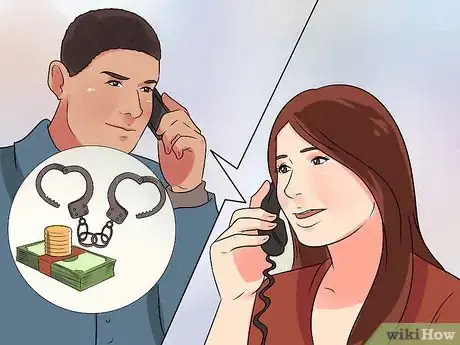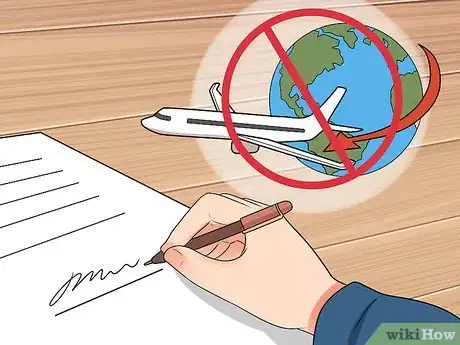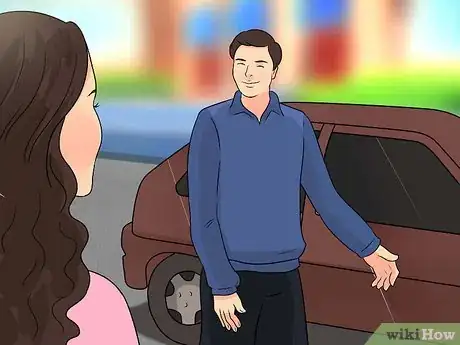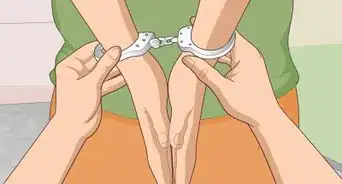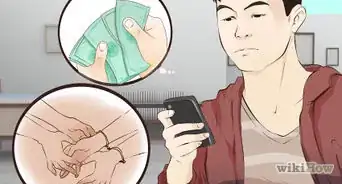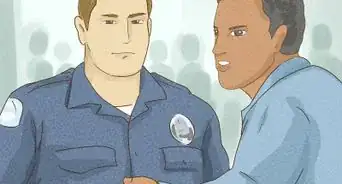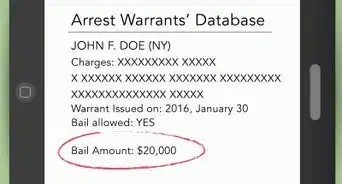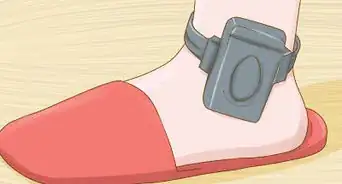X
This article was co-authored by Clinton M. Sandvick, JD, PhD. Clinton M. Sandvick worked as a civil litigator in California for over 7 years. He received his JD from the University of Wisconsin-Madison in 1998 and his PhD in American History from the University of Oregon in 2013.
There are 9 references cited in this article, which can be found at the bottom of the page.
This article has been viewed 528,571 times.
It is two o'clock in the morning, and someone you know has been arrested. You know your friend needs legal help. You can prepare yourself with what you should know and what you should do if a friend is arrested.
Steps
Method 1
Method 1 of 4:
Knowing What to Do If You Are with the Friend during the Arrest
-
1Behave appropriately around the police. If you are with your friend during the arrest, do not behave in a way that will make it worse for your friend. Do not curse at or speak rudely to the police officers. Also, do not try to rile up your friend or get your friend to resist arrest.[1]
-
2Ask the reason for the arrest. Confirm that your friend actually is under arrest. The police may simply want to question your friend. If the police do not have a reason to arrest your friend, they cannot hold him or her for questioning for a significant amount of time.[2]
- If you think that the police don’t have a reason to arrest your friend, tell your friend to ask whether he or she is under arrest or not. Also, ask whether or not he or she is free to go. If the police cannot make an arrest, they have to let your friend go.
Advertisement -
3Stay calm. If you believe the arrest is a misunderstanding, calmly and respectfully explain your reasoning to the arresting officers. Do not lose your temper if the officers do not react to your explanation how you would like.[3]
-
4Get the name of the charge. You can look it up in your state’s penal code. This will allow also inform you of what the officers have accused your friend of doing.
-
5Find out where your friend will be booked. Politely ask the police where they will take your friend for booking. You can then begin making preparations to get your friend out of jail as soon as possible.[4]
-
6Consider calling a family member. If you saw your friend get arrested but haven’t heard from him or her about being released, you may want to call your friend’s parents or other family members. A parent or other family member may have greater resources than you to help your friend, such as retaining a lawyer.
- Your friend may not want you to contact family members. However, if you cannot afford your friend’s bail or if your friend cannot afford a lawyer, it might be the best option.
Advertisement
Method 2
Method 2 of 4:
Knowing What to Do If Your Friend Calls You from Jail
-
1Inform your friend that the call is likely monitored. Your friend should not say anything to you that he or she does not want others to know. Your friend should only offer the factual information such as where he or she is being booked and under what charge.[5]
-
2Ask what the charge is. If your friend is too flustered to offer the information, make sure you ask the charge for the arrest.
-
3Tell your friend not to speak without a lawyer present. The police should have read your friend his or her Miranda rights, which include the rights to remain silent and have an attorney present during questioning.[6] The Miranda rights portion stating that “Anything you say can and will be used against you,” means that your friend should have legal counsel present before answering questions due to the possible consequences.
- After reading your friend his or her Miranda rights, the police can continue to interact with your friend. Any voluntary statements your friend makes to them can be used at the trial.
- The police cannot threaten your friend or force your friend in any other way to talk to them or give them any sort of statement.
-
4Explain an illegal search. The Fourth Amendment states that law enforcement cannot search people’s property without probable cause and a warrant. Tell your friend to talk to the lawyer for any suspicion of an illegal search.
- In the United States, moving vehicles are subject by law enforcement to search with probable cause after a traffic stop. This would not constitute an illegal search.
Advertisement
Method 3
Method 3 of 4:
Helping Your Friend Find a Lawyer
-
1Tell your friend to get a lawyer. If you are present at the arrest, tell your friend to use his or her phone call to contact a lawyer. If your friend used the call to contact you, you can assist in finding a lawyer. Contact your local bar association and ask for a referral.[7]
- You should speak with an attorney who has at least 3 to 5 years of criminal defense experience.
- Find someone who can go speak with your friend in jail.
-
2Inform your friend about the option for a public defender. Your friend has the right to have a lawyer represent him or her even if the friend cannot afford one.[8] You can tell your friend that the judge assigned to the case will appoint a public defender.
- This means the friend should still wait for a public defender before speaking to the police. The friend will not receive a public defender until the arraignment (the first appearance in front of the judge) in most cases.
-
3Follow the lawyer’s advice. Tell your friend that all conversations with his or her lawyer are confidential. Your friend’s lawyer cannot share any information that your friend tells them with outside parties. After hearing the relevant details, the lawyer will offer advice for the best course of action.[9]
Advertisement
Method 4
Method 4 of 4:
Helping Your Friend Make Bail
-
1Find out the bond amount. At an arraignment, the defendant will have their charges read to them, they will have an opportunity to meet with a lawyer (at least a public defender) and will have the opportunity to enter a plea of guilty, not guilty or no contest. If they plea not guilty, then the court will decide whether or not there will be bail and determine what type and how much bail will be.The judge will set conditions on the bond, such as an amount of money. The amount of the bond is set to guarantee that your friend will show up for trial. The bond is refundable as long as the friend shows up for all proceedings.[10]
- If your friend cannot afford the bond amount set by the judge, you or other friends and family may help him or her pay for bail.
-
2Contact a bail bondsman. A bail bondsman is someone who lends money to people in order to enable them to make bond. The bail bondsman usually requires that you put down 10% of the bail amount. He will lend you the remaining bail money.[11]
- If you have trouble locating your friend after his or her arrest, a bail bondsman can help with this as well.
-
3Have your friend sign a “signature bond” if applicable. If the judge determines that your friend is not a flight risk (won’t flee to another state), he or she may release your friend under his or her “own recognizance.” This means the friend will sign a bond recognizing his or her obligation to continue appearing in court for the duration of legal proceedings.[12]
- If your friend fails to appear after signing such a bond, a warrant will be issued for his or her arrest. Your friend will also owe a predetermined amount of money to the court that the judge will decide when issuing the signature bond.
-
4Arrange a ride for your friend. The police will release your friend from detention after someone has posted the bond or signed the signature bond. Ensure your friend has a ride home from the detention facility upon release.
Advertisement
Warnings
- An oral statement is just as bad as a written statement. It is always best to say nothing.⧼thumbs_response⧽
- Never hire an attorney who comes up to you in a hallway outside the courtroom or courthouse and offers his services. He is soliciting, and that is unethical. Judges and court personnel know who these people are and do not treat them with respect. It will hurt you.⧼thumbs_response⧽
- Beware the "Dump Truck" lawyer, ready to rush into a plea bargain. Make sure the lawyer you hire is willing to look into the facts of the case and will believe in your friend and trust your friend's story until it's disproved.⧼thumbs_response⧽
- Police do not have to "read you your rights," and their failure to do so does not invalidate an arrest. They only have to give you your rights if they (a) arrest you and (b) ask you questions about the crime. There are some exceptions to this rule, but they are technical and only a properly trained lawyer can usually identify them; in any case, it is always better to be safe and not volunteer information. Hence, tell your friend to just remain calm and keep asking for an attorney.⧼thumbs_response⧽
- The police are public servants and have a very vital job to perform, but this does not mean they won't try to trick you. When investigating a crime, police are not prevented from giving you misleading or outright untrue information in an effort to elicit a statement from you. Accordingly, don't take everything a police officer says as necessarily true.⧼thumbs_response⧽
- In some states, you have a very limited time or no right at all to contact a lawyer regarding alcohol testing. Also, in many states, refusal to take an alcohol test carries the same penalty as a test failure. Failure to submit to an alcohol screening test, in some states, will result in an automatic suspension of your driver's license, since agreeing to take those tests was a condition of receiving your license. On the other hand, the person arrested may have a good reason not to permit a blood test, (e.g., presence of other substances in blood), as losing driving privileges might not be the biggest worry. Never ask the police for advice; they are paid to be against the arrested person. Get a lawyer on the phone as quickly as possible and ask him.⧼thumbs_response⧽
Advertisement
References
- ↑ http://www.pbs.org/black-culture/connect/talk-back/10_rules_of_survival_if_stopped_by_police/
- ↑ https://dpa.ky.gov/clientandcommunityresources/knowyourrights/Pages/Stop-and-Arrest.aspx
- ↑ https://dpa.ky.gov/clientandcommunityresources/knowyourrights/Pages/Stop-and-Arrest.aspx
- ↑ https://criminal.findlaw.com/criminal-procedure/chronology-the-arrest-process.html
- ↑ https://www.themarshallproject.org/2015/09/04/a-phone-call-from-jail-better-watch-what-you-say
- ↑ https://www.law.cornell.edu/wex/miranda_warning
- ↑ https://www.forbes.com/sites/financialfinesse/2011/10/05/how-to-find-a-good-lawyer-when-you-really-need-one/
- ↑ https://www.law.cornell.edu/wex/miranda_warning
- ↑ https://lawyerist.com/difference-confidentiality-attorney-client-privilege/
About This Article
Advertisement
